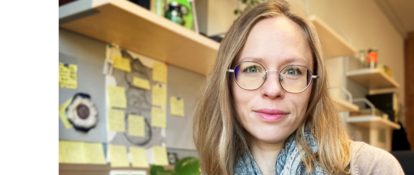There really is no magic path or the right way of doing things, and many obstacles are out of your control. Personal wellbeing should always come first.
Welcome to the winter semester 2022 at the University of Vienna. We would like to introduce you to our anthropologist, Jaanika Vider from the Department of Social and Cultural Anthropology. In her interview she not only shares the ideas of her research topic and the impact it might have on understanding the Arctic as something more than a desolate snowy vacuum but also her experience of doing research in an extreme environment and acknowledging the beauty in unexpected events out there in the field. Read about her project and one of her most important lessons learned as a post doc.
Describe your research in one sentence.
Jaanika: I study ethnographic collections to understand how cultures and peoples have been represented or even created in academic scholarship and public imagination.
Tell us about a normal day in the life of a postdoc.
Jaanika: I am not sure there is a “normal” day in my life – I am still trying to find that golden routine! Most of my days start with sorting out my kids – breakfast, getting ready for school and kindergarten, badgering my son about brushing his teeth and doing the school run. Then I head to my office in the “Neues Institutsgebäude” of the University of Vienna. I usually visit the departmental coffee machine before I unlock my office and then make plans, attend to emails and start reading with a coffee in hand.
How will society benefit from your research?
Jaanika: My research looks at the stories embedded in museums and archives but not just in terms of their provenance and history from a western academic perspective but also their histories, meaning, and affect for originating communities. It means coming up with complex and nuanced narratives that shine light on different modes of knowing and being. These in turn can be presented to the public through museums that steward collections and hopefully, through this, help for larger audiences to learn about perspectives that differ from their own. The Arctic, as a place that few get to experience, is often imagined as an empty snowy landscape, which makes it easy to not appreciate its importance for the global world and the problems associated with extractive industries there. Connecting people in the western metropoles with stories of people living in the Arctic could help to rectify this.
#researchgonewrong: Share a funny/surprising or unexpected anecdote with us from your academic career so far:
Jaanika: Everything about anthropology is unexpected and that is the best bit! It’s not research gone wrong, simply another opportunity to learn. For example, last time I went to Siberia, in 2019, the forest fires were raging everywhere making travel in remote areas really difficult. I arrived in Tura, a town of 5000 and regional capital of Evenkya and was waiting for my friends and project collaborators Anya and Pablo. They were stuck in a small village of Baikyt because helicopters could not fly and we were all nervous that they would not make it before our next flight to Chrinda, a small village near the Arctic circle. Help came from a local interlocutor who instructed Anya in the bear skin shaking ritual to make it rain. And it rained! My friends arrived and together we spent the next few days in the tiny local airport hoping for a helicopter to Chirinda. We spent hours in the waiting room, which provided a good location to speak to locals and gather their views on the museum collection we were working on. On the way back the helicopter was so heavy it had to gather speed on the runway to take off!
What does REWIRE mean to you?
Jaanika: REWIRE is a wonderful opportunity to focus on my research: to explore new ideas and to develop it in the directions that excite and interest me. It is also a wonderful community of other women researchers with whom to share the journey we’ve embarked on in Vienna. I just feel incredibly privileged to have this academic freedom and a supportive network.
I think that the programme not only allows me to develop as a researcher but has also helped me to feel more prepared when I look towards planning the next steps in my career path.
Another aspect of the REWIRE project which I benefit from is the network of women that it has formed and the advice and support that we can provide to each other at this career stage.
Who is your personal heroine?
Jaanika: I will repeat my colleagues here and say that there is no one heroine. When I was younger, I was also quite naïve in not noticing the women role models making the space for my generation. As an undergraduate I dismissed a course on feminist anthropology as something quite irrelevant to myself. Only through the process of getting a PhD researching a woman academic, trying to forge an academic career while taking maternity leave and caring for kids, and seeing that so many obstacle women faced 100 years ago are still pertinent, did I start to really appreciate the many wonderful teachers and collaborators I had.
The most important lesson learned so far that you want to share with other future (female) early post docs:
Jaanika: Make sure you’re happy and content in what you do, whether it is personal or professional. There really is no magic path or the right way of doing things, and many obstacles are out of your control. Personal wellbeing should always come first.
Quickfire Questions
Keyboard or Pen?
Pen
Vanilla or chocolate ice cream?
Vanilla
Early bird or night owl?
Night owl by nature, early bird due to circumstances.
Find more information on Jaanika's research here.

